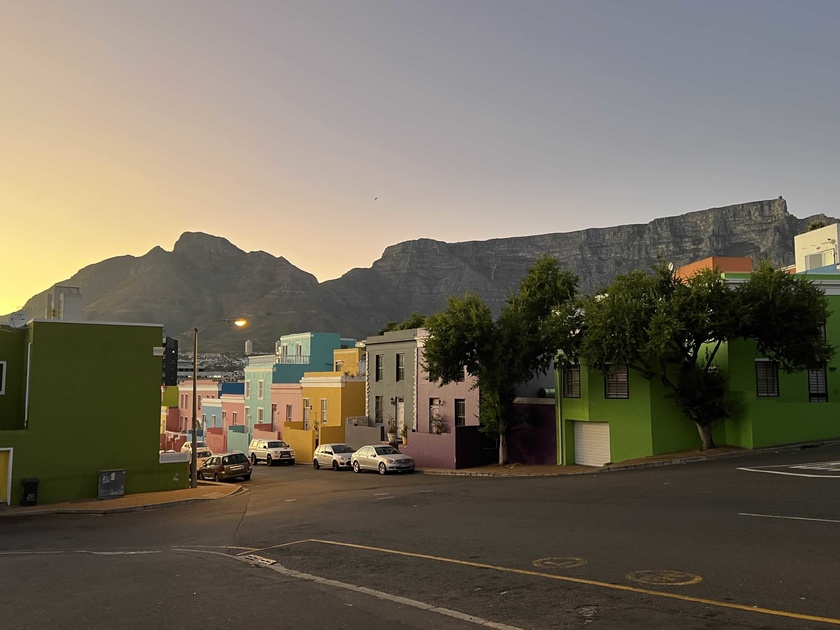Yesterday I explored the city from the wealthiest neighborhoods to the poorest. I took a long, 7-mile run through the Bo Kaap, over Signal Hill, and down into Sea Point, taking in the spectacular views of Table Mountain and the bay. It was thrilling to see how lively the city is in the morning, as people take their morning exercise. My gauge of the degree of personal safety in the city is whether you see women walking alone. And though Cape Town still has some of the same crime problems that plague the rest of the country, there were plenty of women running or exercising alone along the seawall -- as well as older people and families with young children just taking a morning stroll.
Later, I went to Khayelitsha, one of the poorest townships in South Africa. It has been transformed by housing policy in the Western Cape, which departed from nation policy in that it gave grants directly to community groups to build housing, rather than waiting for the national government to take charge. As a result, areas that were once shantytowns have many permanent homes and structures. There is even a new shopping mall in Site C, where I used to teach and volunteer. I visited the home of the late Vicky Ntozini, who started a little bed and breakfast but was murdered by her husband. Her family is still there, headed by her daughter, Malandi. They are struggling, but they have hope.
I headed back into town for lunch, tea, and dinner with various and sundry friends, whom it was delightful to see. The garden at the Vineyard Hotel is a particularly dramatic setting. As Malandi told me: even if you live here, the beauty of Cape Town never ceases to be amazing on an everyday basis.
I also stopped my by (graduate) alma mater, the University of Cape Town. It is still spectacular, despite recent ups and downs, and it was fun to watch students practicing rugby. I took in the empty cube where the statue of Cecil John Rhodes sat until it was torn down at the behest of radical students. The "Rhodes Must Fall" movement gave birth to the contemporary "woke" phenomenon. We are still living with the consequences -- a bit of ugliness amid the beauty here.
If you're not already subscribed to my Locals, please take the opportunity to join now!
This week’s portion launches the great story of Abraham, who is told to leave everything of his life behind — except his immediate family — and to leave for “the Land that I shall show you.”
There’s something interesting in the fact that Abraham is told to leave his father’s house, as if breaking away from his father’s life — but his father, in fact, began the journey, moving from Ur to Haran (in last week’s portion). His father set a positive example — why should Abraham leave him?
Some obvious answers suggest themselves — adulthood, needing to make one’s own choices, his father not going far enough, etc.
But I think there is another answer. Abraham (known for the moment as Abram) needs to establish his own household. This is not just about making one’s own choice, but really about choosing one’s own starting point. It’s starting over.
Sometimes we start over in fundamental ways even if much that surrounds us remains the same. Sometimes the journey we have to ...
The story of Noah is familiar; the details, less so.
Noah is often seen as an ambivalent figure. He was righteous -- but only for his generation. What was his deficiency?
One answer suggests itself: knowing that the world was about to be flooded, he built an Ark for the animals and for his own family -- but did not try to save anyone else or to convince them to repent and change their ways (the prophet Jonah, later, would share that reluctance).
Abraham, later, would set himself apart by arguing with God -- with the Lord Himself! -- against the destruction of Sodom and Gomorrah, saying that they should be saved if there were enough righteous people to be found (there were not).
Still, Noah was good enough -- and sometimes, that really is sufficient to save the world. We don't need heroes every time -- just ordinary decency.
Hi all -- as I noted last month, I'm going to be closing down my Locals page, at least for tips and subscriptions -- I may keep the page up and the posts as well, but I'm no longer going to be accepting any kind of payment.
Look for cancelation in the very near future. Thank you for your support!





















